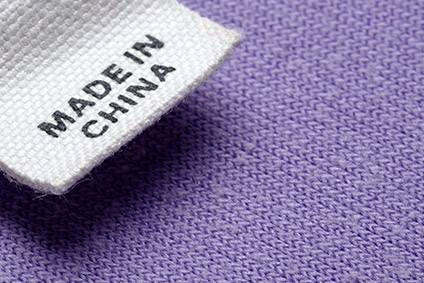
Major apparel companies H&M Group, Nike Inc, and Boohoo Group have told UK politicians they do not have any supply chain links to the Xinjiang region of China, with Boohoo revealing plans to map all of its global tier-one and tier-two supply chains over the next year.
Companies operating in the UK were called to submit evidence during a meeting of the Business, Energy and Industrial Strategy (BEIS) Committee yesterday (5 November) following a probe launched by the body in September to look at the extent to which businesses in the UK are linked to the use of forced labour of Uyghurs Muslims in Xinjiang. It followed a recent report by the Australian Strategic Policy Institute (ASPI) that mapped nearly 380 of China’s controversial detention centres in Xinjiang province.
Speaking to UK members of parliament (MPs), Andrew Reaney, newly-appointed group director of responsible sourcing for the Boohoo Group, said the company’s code of conduct explicitly prohibits any bonded, forced, or involuntary labour in any part of its supply chain.
“We were quite shocked by the revelations around the Uyghurs and what’s happening in the Xinjiang province, so one of the first things we did was write specifically to all our suppliers across the supply chain to confirm that we have no manufacturing or fabric links to that particular region. All of the suppliers confirmed that we have no links, no manufacturing or fabric links, to that particular region.”
To support that work, Boohoo has tasked auditing firm Bureau Veritas to map all of its tier-one and tier-two supply chains across the globe.
“It is absolutely 100% our commitment that we will have a completely fully transparent tier-one and tier-two supply chain disclosed within the next 12 months,” Reaney added.

US Tariffs are shifting - will you react or anticipate?
Don’t let policy changes catch you off guard. Stay proactive with real-time data and expert analysis.
By GlobalDataReaney was appointed to the role in September after Boohoo pledged to strengthen its sourcing team and work more closely with suppliers after an independent review into its UK supply chain identified “many failings”.
The probe, which was conducted by senior barrister Alison Levitt QC, was launched after media reports surfaced in July that one of Boohoo’s Leicester-based supplier factories was paying staff GBP3.50 (US$4.38) an hour to work in unsafe conditions and in breach of UK coronavirus lockdowns.
Speaking yesterday, Reaney told MPs it was “absolutely fair” to say the group has had some challenges in its UK supply chain but noted in the context of China: “We can categorically state we do not knowingly source any yarn or fabric from the Uyghur province and we do not knowingly directly or indirectly manufacture within that region.”
David Sävman, head of supply chain for H&M Group, also spoke at the hearing, telling MPs: “When these very serious allegations came up we did a lot of investigation into all of our suppliers. We didn’t find any proof of any of our suppliers breaching any of our sustainability commitments where we have very clear guides on how our ethical recruitment should happen.”
He added H&M continued working with the International Labour Organization (ILO) to further strengthen its due diligence.
Meanwhile, Sean Cady, vice president, global sustainability and responsibility at VF Corporation, told MPs there is no reason for concern with regards to the group.
“You should not be concerned about us, we prohibit all forms of modern slavery including enforced labour in our direct operations and in our contract suppliers.”
Also speaking to MPs was Jaycee Pribulsky, vice president for global footwear sourcing and manufacturing at Nike Inc.
“We are deeply concerned with reports of the situation in the XUAR (Xinjiang Uyghur Autonomous Region). Nike is committed to ethical and responsible manufacturing and our approach is aligned with the UN Guiding Principles for business and human rights and we work to also align to the ILO conventions.
“To be clear, Nike does not source any raw cotton. With regard to the XUAR, Nike has confirmed with our material suppliers that there are no spun yarns or textiles manufactured in the XUAR in our products. Nike does not source products manufactured in the XUAR or materials as well.”
Pribulsky added the situation is “unprecedented in modern supply chains”, noting Nike has continued to conduct ongoing diligence and further strengthen its audit protocols.
“One of the things we have done is essentially work with our suppliers in China to identify and assess potential risks related to the employment of Uyghurs and other ethnic minorities and, as we have gone through that process, our further diligence has found no employment of Uyghurs or other ethnic minorities from the XUAR elsewhere in our supply chain in China.”
At the end of last month, The Better Cotton Initiative (BCI) called an immediate halt to all field-level activities in the XUAR, where ongoing allegations of forced labour and other human rights abuses “have contributed to an increasingly untenable operating environment.”
BCI, which trains farmers on more sustainable cotton production, suspended its licensing and assurance activities in the XUAR in March, meaning there is now no new licensed Better Cotton coming from the region.
The US is forging ahead with moves to tackle the import of apparel and other goods from the XUAR, and has earmarked China as a global hotspot for goods made using forced labour.
The Uyghur Forced Labor Prevention Act (H.R. 6210), which cleared a House vote in the US in September, establishes the legal presumption that any products arriving at US ports that were manufactured in the Uyghur Region, or containing inputs from the region, were made using forced labour. Unless the importer can prove there was no forced labour used in its production, the product is considered illegal and is barred from entering the US.



